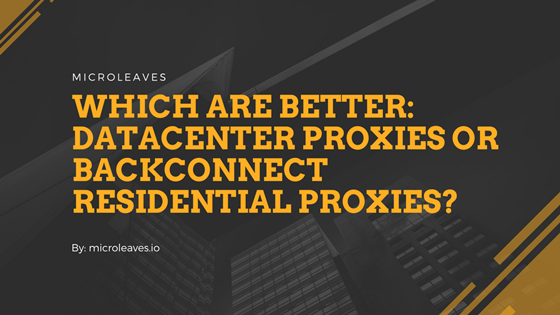The IP, on any digital device you use to connect to the internet, is essentially your identity for all the websites you visit. In certain instances, you have to protect your identity and keep your own IP private and to accomplish that one has to utilize proxies. They can create a safety net between you and the internet.
The reasons why one may want to use a proxy can vary; you may want to access websites that are blocked in your region. You may want to visit a website without giving away your location or you just like your privacy and you want to protect it from the nefarious characters online.
Whatever your reasons may be, you will either have datacenter proxies or backconnect residential proxies as choices. Each option has its pros and cons and you need to learn about them to choose which suits your requirements best.
Datacenter Proxies
These IPs are not provided by service providers. The IP is rented by hosting, DNS system or through other cloud-based services. This type of proxy can be a virtual barrier between you and online privacy violators. Your personal IP is hidden and the datacenter IP is broadcasted instead.
You can surf the internet anonymously and visit any site you want that may be prohibited in your region. You will have to contact a datacenter to get a batch of these IPs and use them over a period of time.
These proxies are hosted on dedicated servers, which act as the go-between your digital device and the websites you are trying to access. You are given a unique username/password to authenticate the IP and they can cost about $2 per IP.
Backconnect Residential Proxies
Whenever you get a new internet connection, the ISP (internet service provider) will give you a residential IP. This IP will give you access to the internet and you can find out about this IP online.
You can also find the location where the IP is originating from, not exact but a rough one. These IPs are dynamic and can change over time, whenever the ISP wants to or when you reset your router.
Backconnect residential proxies also hide your personal IP from internet servers. Instead of the dedicated servers, there are P2P routing services in the middle.
A residential proxy provider like Microleaves will provide you with P2P routing with multiple ports in an affordable price. The proxies are rotating and the IPs are assigned from a pool available. The IP and Port will change every few minutes, giving you absolute online security.
Datacenter proxies vs. Residential proxies
The common thread between the datacenter and backconnect residential proxies is that they both provide anonymous access to the internet for users. While using either type of proxy, your real location will remain hidden and another virtual location will be broadcasted to the servers you are connecting to online.
The biggest difference between the two proxies is that one is provided by an ISP or proxy service providers. The other is purchased from datacenter service providers. To get a better idea of how these two types of proxies differ from each other, here are their salient points:
Pros of Datacenter proxies
Fast Speed
Datacenter proxies have decent speeds as they are hosted on different servers around the world. It is easier to find such proxies near your location which makes them more efficient.
Stable Uptime
Datacenter proxies are reliable as they offer maximum uptime to users, as they are hosted on different servers around the world. There can be an issue if you cannot find a datacenter near your location. The connection can be slow in this situation.
Low Cost
Datacenter proxies are low cost, you can get an IP for just $2, which is comparatively lower than backconnect residential proxies. If you choose to purchase them in bulk, they can cost even less.
Pros of Backconnect Residential Proxies
Faster Speed
Residential proxies are faster because you don’t have to rely on external entities for them. They are part of your network so there is no lag of any kind.
Best Uptime
Backconnect residential proxies offer an uptime of 99.9% to users. If they are provided by the ISP the uptime is guaranteed. Even some proxy service providers offer that kind of uptime to users.
Natural
Being more natural means that backconnect residential IPs do not rely on unconventional activities like spamming. Datacenter IPs rely on these activities and have the potential of getting blocked.
Safer
When you get backconnect residential IPs from providers like Microleaves, you can be sure that your online safety is guaranteed. There is a very low chance of these proxies getting blacklisted, as compared to datacenter ones.
They are trusted and considered safer by servers around the world. In a way, the costs of residential IPs is lower because you can use them for longer.
Final Word
The information above should make the differences and similarities between the two proxies very clear. And it should also clarify which proxy you should get for your private use.
If you are in the market for quick proxy connection, datacenter proxies are a good choice for you. But for more reliable and stable performance backconnect residential proxies are best.
You can keep a distance from web scraping, spamming etc. which are a common practice in datacenter proxies. Datacenter proxies can cost more because of this reason.
They can get blacklisted and you will have to purchase and use another one raising your expense. Residential IPs are natural and trusted throughout the virtual world.
Both proxies offer the basic two function that one requires from proxy IPs, which is providing safety and anonymity. Residential IPs should be preferred as they are accepted by all websites, even where datacenter IPs could get you into trouble.
You don’t want to have to be worrying about getting an IP flagged every time you go online. For your peace of mind, rely on residential IPs and forgo datacenter proxies.

